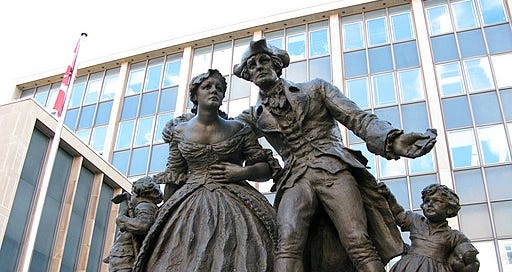the genealogy book
, on various United Empire Loyalist threads, and how Sir John Johnson may have been a bit of a jerk,
I’ve been researching further on the movements of those United Empire Loyalists, to better understand the period of conflict and confiscated lands to eventual settlement north of the border, and the uncertainty and chaos that most certainly set across those two distinct poles. In The Loyalists of Quebec 1774-1825: A Forgotten History (1989), Hereward Senior’s chapter, “The Loyalists in Quebec: A Study in Diversity,” offers that “Until the end of the war it was assumed that the Loyalist refugees in Quebec would return to their homes when hostilities ceased. When this became impossible, [French speaking Swiss Governor of Quebec Sir Frederick] Haldimand had to balance his sympathy for the Loyalists against his conviction that Quebec must remain French.” Imagine, from such a distance as this, thinking that such would be temporary, and they could return home.
Instead, the short-term designation of Sorel, Missisquoi Bay, and the Eastern Townships that extended what evolved into the Province of Quebec; of Sir John Johnston, moving west along the St. Lawrence River across hundreds of kilometres, and the establishments of townships and settlements. Of Dr. Samuel Adams and his family, and Samuel Rose, and realizing how these Loyalists prompted the direct Americanization and Anglicization of an almost complete French-language stretch. Senior, again, writes: “Apart from a sprinkling of anglophone merchants and seigneurs, and a few hundred Fraser Highlanders on the road to assimilation, there was no anglophone rural population in the province of Quebec.” A surge of some thousands of English-speaking refugees across the American border loyal to the British crown strewn across British territory enough that the Seigneury of Sorel was purchased in the name of King George III in November 1781 to hold them. A surge enough, as the United Empire Loyalists Association of Canada website writes, as part of their “Loyalists in the Eastern Townships” piece:
The arrival of thousands of Loyalists north prompted the British Parliament to pass the Quebec Act in 1774, to recognize French civil and religious rights. To appease the Loyalist settlers, as well, Great Britain passed the Constitutional Act in 1791, which divided the settlement into two separate provinces: Upper Canada and Lower Canada.
I had no idea I had any Loyalist threads, let alone so many; more than I might easily attend. Dr. Samuel Adams, and his six children. Samuel Henry Rose. Jacob Van Allen Sr. (1755-1836), or Benjamin F. Barber. James Froom (1773-1865) to Humphrey Smith (1767-1818) and Lurana Lorena Vaughn (1768-1820). Elizabeth Betsey Becker (1782-1869), to Heinrich Joachim Barkley (c. 1775-1844). All American-born, all forced back across British lines. The vagaries of history, as those expensive colonies required funds to hold their wars (most of which were with locals), and, between the colonies and battles on the continent, the British purse drained. The Crown sought replenishment, and the colonists rebelled. They drained forth, setting the stage for larger English-speaking occupation into the development of Upper and Lower Canada, and the possibility of further immigration from Europe.
These accidents of history, as much as they’d make me. Dr. Samuel Adams of Arlington, Virginia, who lost his father and brother to the Patriots to land at the fortified Sorel, established as central military hub. Sorel, which took in refugees, and expanded to village. The excess so great that anyone capable of securing their own livelihood was essential. As Earle Thomas, in his chapter “The Loyalists in the Montreal Area, 1775-1784” in the same volume, wrote of how the situation required Major John Nairne to strike “[…] Samuel Adams off the list, since Adams was deemed quite capable of supporting himself in his capacity as a doctor.” Samuel Adams, who worked as a doctor and eventually moved further afield, as an innkeeper. Thomas continues:
Adams seems not to have been very highly regarded, Sir John Johnson described him as a “Canting Cunning fellow” with a “very indifferent character.” The Inspectors of the Loyalists were no doubt influenced in making character assessments of their charges by the amount of trouble they caused.
Thomas seems to take this comment at face value, but in the same volume, Hereward Senior offers this particular further commentary by Sir John Johnson, which I think adds a bit of context:
Edward Jessup, who took over as Inspector of the Loyalists in the winter of 1782, was described by Sir John Johnson as “a justice of the peace, a loyal subject, and a plain honest countryman.” He was one of three Loyalist brothers who came to Canada from Albany. Ebenezer, the eldest, a loyal subject, lived by land jobbing and owned mostly uncultivated lands. Joseph, the youngest, Sir John regarded with apprehension: “a silly creature that lived like a common farmer by hard labour.”
Oh, those foolish considerations of wealthy men to live like commoners. Dear Brigadier-General Sir John Johnston, 2nd Baronet (1741-1830): I think your privilege is showing.




